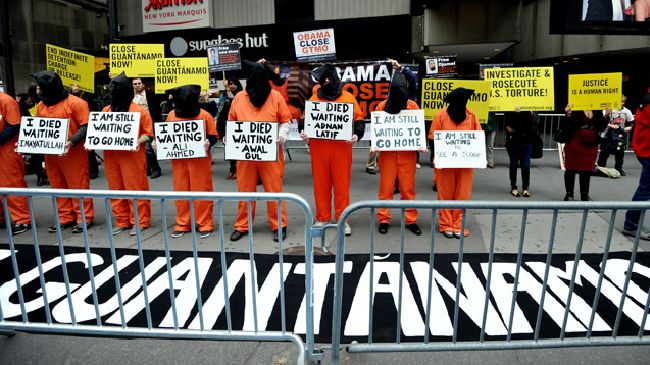
One of the inmates on hunger strike at the US military’s Guantanamo prison and torture camp has described the force-feeding procedures by the prison staff as painful and degrading, declaring that “Gitmo is killing me.”
“Last month, on March 15, I was sick in the prison hospital and refused to be fed. A team from the ERF (Extreme Reaction Force), a squad of eight military police officers in riot gear, burst in. They tied my hands and feet to the bed. They forcibly inserted an IV into my hand. I spent 26 hours in this state, tied to the bed,” said Guantanamo inmate Samir Naji al-Hasan Moqbel in an article printed in the opinion pages of the New York Times on Monday.
“During this time I was not permitted to go to the toilet,” he added. “They inserted a catheter, which was painful, degrading and unnecessary. I was not even permitted to pray.”
The article was drawn from the story Moqbel, a Yemeni inmate at the US military prison since 2002, told his American lawyers through an Arabic interpreter in a telephone conversation.
“I can’t describe how painful it is to be force-fed this way… it made me feel like throwing up. I wanted to vomit, but I couldn’t. There was agony in my chest, throat and stomach. I had never experienced such pain before. I would not wish this cruel punishment upon anyone,” Moqbel added.
According to Moqbel, he has been held at the notorious American military detention and torture facility “for 11 years and three months” but never charged with any crime. “I have never received a trial,” he insists.
“I could have been home years ago – no one seriously thinks I am a threat – but still I am here. Years ago the military said I was a “guard” for Osama bin Laden, but this was nonsense, like something out of the American movies I used to watch. They don’t even seem to believe it anymore. But they don’t seem to care how long I sit here, either,” the Yemeni inmate further explained.
Moqbel also elaborate that he had travelled to Afghanistan to seek work, but following the US military invasion of the country he fled to Pakistan “like everyone else” and was arrested when he inquired about seeing someone from the Yemeni Embassy there.
“I was then sent to Kandahar, and put on the first plane to Gitmo,” he added.
“I don’t want to die here,” Moqbel emphasized. “Where is my government? I will submit to any “security measures” they want in order to go home.”
He further blamed US President Barack Obama for refusing to send any of the Yemeni inmates back to their native land.
According to Moqbel, he is still being force-fed twice a day while his arms, legs and head are strapped down to a chair in his cell.
“The situation is desperate now. All of the detainees here are suffering deeply. At least 40 people here are on a hunger strike. People are fainting with exhaustion every day. I have vomited blood.”
The Yemeni hunger striker went on to reiterate, “When they come to force me into the chair, if I refuse to be tied up, they call the ERF team. So I have a choice. Either I can exercise my right to protest my detention, and be beaten up, or I can submit to painful force-feeding.”
He concluded by insisting that there is “no end in sight to our imprisonment,” expressing hope that by hearing about the sufferings of the Gitmo prisoners, “the eyes of the world will once again look to Guantanamo before it is too late.”
Guantanamo hunger strikers stopped eating to protest their indefinite imprisonment without charges. They are also demanding an end to the intrusive search of their cells and personal belongings.
The United States still holds about 166 inmates at its military prison facility. An earlier mass hunger strike in 2005 involved many of the prisoners, but the protest dwindled after the US military began tying people down and force-feeding them liquid nutrients through tubes to prevent them from starving to death.







